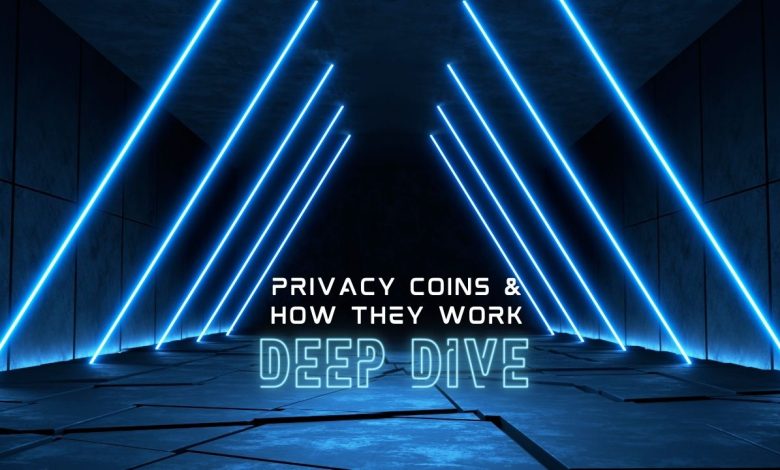A Deep Dive into Privacy Coins: Monero, Zcash, and Dash

- Understanding the concept of privacy coins
- Comparison of Monero, Zcash, and Dash in terms of privacy features
- Exploring the technology behind Monero’s privacy protocol
- An in-depth look at Zcash’s zk-SNARKs and shielded transactions
- Examining the governance model of Dash and its impact on privacy
- Challenges and controversies surrounding privacy coins in the cryptocurrency space
Understanding the concept of privacy coins
Privacy coins are a type of cryptocurrency that focuses on enhancing the anonymity and confidentiality of transactions. These coins utilize various technologies and protocols to ensure that the identities of the transacting parties remain private and untraceable. By implementing features such as stealth addresses, ring signatures, and zero-knowledge proofs, privacy coins offer users a higher level of privacy compared to traditional cryptocurrencies like Bitcoin.
One of the most popular privacy coins is Monero. Monero uses a technology called ring signatures to mix the sender’s address with a group of others, making it nearly impossible to trace the origin of a transaction. This ensures that the sender’s identity remains confidential. Additionally, Monero employs stealth addresses, which generate a unique, one-time address for each transaction, further enhancing privacy.
Another prominent privacy coin is Zcash. Zcash utilizes a technology called zk-SNARKs, which allows for transactions to be verified without revealing any sensitive information, such as the sender’s address or the transaction amount. This technology provides users with the option to make either transparent or shielded transactions, depending on their privacy preferences.
Dash, while not solely focused on privacy, offers optional privacy features through its PrivateSend functionality. PrivateSend mixes transactions from multiple users, making it difficult to trace the flow of funds. This feature provides users with an added layer of privacy when conducting transactions on the Dash network.
Overall, privacy coins play a crucial role in the cryptocurrency space by offering users the ability to transact anonymously and securely. As concerns about data privacy and security continue to grow, privacy coins are likely to become increasingly popular among individuals looking to protect their financial information from prying eyes.
Comparison of Monero, Zcash, and Dash in terms of privacy features
When comparing **Monero**, **Zcash**, and **Dash** in terms of **privacy features**, it is essential to understand the unique approaches each cryptocurrency takes to ensure user anonymity.
**Monero** is known for its strong focus on privacy and anonymity. It uses ring signatures, stealth addresses, and confidential transactions to obfuscate the sender, recipient, and amount of each transaction. This ensures that all transactions on the Monero network are private and untraceable.
**Zcash**, on the other hand, offers users the option to make either transparent or shielded transactions. Shielded transactions use zero-knowledge proofs to encrypt transaction data, providing enhanced privacy. However, it is important to note that only a small percentage of Zcash transactions are shielded, which may impact overall privacy on the network.
**Dash** also offers optional privacy features through its PrivateSend functionality. This feature mixes transactions from multiple users, making it difficult to trace the origin of funds. While PrivateSend can enhance privacy, it is not as robust as the privacy features offered by Monero and Zcash.
In conclusion, **Monero** stands out for its strong emphasis on privacy, with all transactions being private by default. **Zcash** offers users the choice between transparent and shielded transactions, providing flexibility in privacy options. **Dash** provides optional privacy features through PrivateSend, although it may not offer the same level of anonymity as Monero and Zcash. Ultimately, the choice of which privacy coin to use will depend on the user’s specific privacy needs and preferences.
Exploring the technology behind Monero’s privacy protocol
Monero’s privacy protocol is built on a technology called Ring Signatures, which obfuscates the sender’s address by mixing it with a group of other addresses. This makes it nearly impossible to trace the origin of a transaction. In addition, Monero uses Stealth Addresses, which generate a one-time address for each transaction, further enhancing privacy. These features combined with Ring Confidential Transactions (RingCT) ensure that the amount being sent is also hidden. This robust privacy protocol has made Monero a popular choice for users seeking anonymity in their transactions.
Monero’s privacy features have been put to the test by various researchers and experts in the field, and it has consistently proven to be one of the most secure privacy coins available. The technology behind Monero’s privacy protocol is constantly evolving to stay ahead of potential threats and ensure the anonymity of its users. This commitment to privacy and security has helped Monero gain a reputation as a reliable and trustworthy cryptocurrency for those who value their financial privacy.
Overall, Monero’s privacy protocol is a sophisticated system that leverages cutting-edge technology to provide users with a high level of anonymity and security. By combining Ring Signatures, Stealth Addresses, and RingCT, Monero has created a robust privacy protocol that is difficult to crack. As the cryptocurrency landscape continues to evolve, Monero remains at the forefront of privacy coins, offering users a reliable and secure way to transact anonymously.
An in-depth look at Zcash’s zk-SNARKs and shielded transactions
Zcash is a cryptocurrency that prioritizes privacy through the use of zk-SNARKs, which stands for “zero-knowledge succinct non-interactive arguments of knowledge.” This technology allows for shielded transactions, where the sender, recipient, and transaction amount are all encrypted. This ensures that the details of the transaction remain confidential, providing users with a high level of privacy.
zk-SNARKs enable Zcash to maintain a public blockchain while still keeping transaction details private. This is achieved by allowing users to prove that a transaction is valid without revealing any sensitive information. By using zk-SNARKs, Zcash strikes a balance between transparency and privacy, making it an attractive option for those seeking anonymity in their transactions.
Shielded transactions in Zcash are optional, meaning that users can choose whether or not to make their transactions private. This flexibility allows for a range of use cases, from completely transparent transactions to fully shielded ones. By giving users the power to decide how private they want their transactions to be, Zcash caters to a wide range of privacy preferences.
Examining the governance model of Dash and its impact on privacy
The governance model of Dash plays a crucial role in shaping the privacy features of the cryptocurrency. Dash utilizes a decentralized autonomous organization (DAO) structure, allowing masternode operators to vote on proposals that impact the network. This governance model has enabled Dash to implement features such as PrivateSend, which enhances the privacy of transactions on the network.
The impact of Dash’s governance model on privacy is significant. By allowing masternode operators to vote on proposals, Dash can quickly adapt to changing privacy needs and implement new features to enhance user anonymity. This flexibility sets Dash apart from other privacy coins and ensures that it remains at the forefront of privacy innovation in the cryptocurrency space.
Furthermore, the decentralized nature of Dash’s governance model ensures that no single entity has control over the network. This distributed decision-making process helps to protect user privacy by preventing any one party from exerting undue influence over the network. As a result, Dash users can have confidence that their transactions are secure and private.
Overall, the governance model of Dash has a positive impact on privacy by enabling the rapid implementation of new features and ensuring that no single entity can compromise user anonymity. This commitment to privacy makes Dash a compelling option for users seeking to protect their financial information while transacting in the digital realm.
Challenges and controversies surrounding privacy coins in the cryptocurrency space
Privacy coins have been a topic of debate within the cryptocurrency community due to the challenges and controversies surrounding their use. One of the main concerns is the potential for privacy coins to be used for illicit activities such as money laundering and tax evasion. This has led to regulatory scrutiny and calls for increased transparency from privacy coin projects.
Another challenge facing privacy coins is the perception that they enable criminal behavior by providing a high level of anonymity. While privacy coins do offer enhanced privacy features compared to other cryptocurrencies, they are not inherently illegal. Advocates argue that privacy is a fundamental right and that privacy coins can help protect individuals’ financial information from prying eyes.
Despite these arguments, privacy coins continue to face resistance from regulators and financial institutions. Some exchanges have delisted privacy coins due to regulatory pressure, making it harder for users to trade these assets. This has raised concerns about the future viability of privacy coins in the cryptocurrency space.




